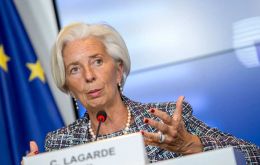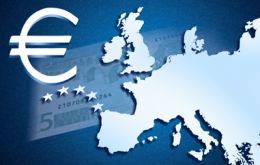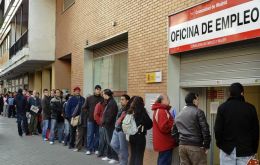MercoPress. South Atlantic News Agency
Tag: Eurostat
-
Tuesday, August 1st 2023 - 18:48 UTC
Euro Zone inflation down to 5,3% in July, helped by lower energy prices

Inflation in the Euro-zone fell to 5.3% in July, down almost a percentage point from May, the EU statistics agency Eurostat said on Monday. in June the rate of inflation was 5,5% as compared with 6.1% in May.
-
Friday, September 9th 2022 - 07:53 UTC
Euro zone adopts an aggressive rates policy: “inflation remains too high and is likely to stay”

The European Central Bank decided on Thursday to increase the three key interest rates by 75 basis points, making a dramatic change from the prevailing transition accommodative rates' levels to ensure a timely return to the ECB's inflation target of 2%.
-
Tuesday, May 3rd 2016 - 12:02 UTC
Euro zone economy expands faster than expected in the first quarter

The Euro-zone's economy grew by a faster-than-expected 0.6% in the first three months of the year, according to official statistics. The growth rate in the 19-nation bloc doubled from the 0.3% rate recorded in the previous quarter, and was above analysts' expectations of 0.4%.
-
Friday, May 1st 2015 - 06:22 UTC
Euro zone scrapes out of deflation in April; unemployment remains above 11%

Consumer prices in the Euro zone scraped out of deflation in April after four months, official data has shown, boosting hopes of economic recovery in Europe. The inflation rate in the 19 nations that use the Euro stood at 0% in April, up from a rate of -0.1% in March. Eurostat said that low energy costs were continuing to cut living costs.
-
Monday, February 17th 2014 - 09:23 UTC
Euro-zone growth still fragile but stronger than expected at the end of 2013

Economic growth across the Euro-zone was stronger than expected at the end of 2013, according to official figures, raising hopes the recovery is gaining a foothold. Gross domestic product grew by 0.3% in the October-December period from the previous quarter, said Eurostat, the European Union’s statistics office. That amounts to an annualized rate of about 1.2 %.
-
Wednesday, July 31st 2013 - 16:54 UTC
Slightly encouraging signs from the EU in employment and manufacturing

The number of unemployed in the Euro-zone has fallen, slightly, for the first time since April 2011. The fall in June came amid brightening economic prospects, suggesting an end to the bloc’s stubborn recession.
-
Friday, February 15th 2013 - 05:34 UTC
Germany and France poor performance plunge Euro zone into recession

The Euro zone slipped deeper into recession in the last three months of 2012 after its largest economies, Germany and France, shrank markedly at the end of the year. It marked the bloc's first full year in which no quarter produced growth, extending back to 1995.
-
Tuesday, January 8th 2013 - 20:41 UTC
Euro-zone unemployment up for 19th month running; Spain with record 26.6%

The unemployment rate across the troubled Euro zone hit 11.8% in November, up from 11.7% in October, with the number of people out of work in the 17-nation single currency area now nudging 19 million. Spain again recorded the highest with 26.6% and 57% for the under-25s.
-
Monday, October 1st 2012 - 20:32 UTC
Euro-zone: no end in sight to the scourge of unemployment an increasing poverty

Unemployment in the Euro-zone hit a fresh high of 18.2 million in August, the EU statistics agency has said. The number out of work rose by 34.000, but after the July data was revised up, it meant the unemployment rate remained stable at a record high of 11.4%.
-
Friday, September 7th 2012 - 02:55 UTC
OECD warns recession is “taking hold” of Euro zone including largest economies

Europe's debt crisis is pushing the 17-country Euro-zone toward recession and dragging down the global economy, the Organization for Economic Cooperation and Development said in a report.
